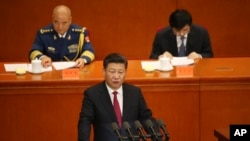Chinese President Xi Jinping marked the Communist Party's 95th anniversary with a speech that emphasized how Marxism remains core to the party's identity, and analysts saw the remarks as further signs of the leader's intolerance for political liberalization.
“There’s nothing in the speech that indicates that Xi Jinping has at all decided that he needs to compromise with those elements in the mainland, who are seeking the liberalization of the political system,” said Barry Sautman, a professor with the social science division at Hong Kong University of Science and Technology.
For example, in his address, Xi said, “no one is above the Constitution in China.” But that doesn’t mean that China will push forward reform to endure an independent judiciary as court judges have long been composed of party members, the professor said.
Liberal forces from within
Thus, the liberal forces, mostly from within the party and the academic circles, may pose a threat to the party and Xi’s rule although Xi and other major leaders may see liberals as unfriendly forces, which they need not to compromise with, Sautman added.
“The biggest threat is what might, in earlier times, have been called the bourgeoisification,” Sautman said, “That is, the idea that, among the leaders of the party, there would be people who have decided, out of their own interests, that they want to fundamentally change the political system…, which would in effect overthrow the Communist Party regime.”
While stressing the importance of reform and openness, Xi also called upon the nation to fulfill the country’s two centenary goals. That is, to build China into a “moderately prosperous society” in all respects by 2021, which will lay a solid foundation for reaching the second centenary goal of building China into a modern socialist country that is richer, stronger and more democratic.
By its own statistics, China should have no problem reaching the first centenary goal — doubling its 2010 GDP in 2020 — shortly before Xi steps down in 2022, said Zhang Lifan, a Beijing-based independent historian and political observer.
If achieved, it will also counter-balance any efforts on the part of liberal forces to topple the CCP regime, professor Sautman said.
But Zhang argued that, if failing the goal, it may become a convenient excuse for Xi’ to extend his terms — the biggest fear among those within the party who do not recognize Xi as a capable leader.
“He [Xi] may try to look powerful, but his power isn’t unwavering given his gang of cadres is inexperienced, lacks clout and has offended many people,” Zhang said.
Xi’s unstable power
All in all, the well-known historian said that Xi’s speech exposes his and the party’s own sense of crisis in terms of ruling legitimacy.
“I think, such a high-profile speech has mainly manifested the Chinese Communist Party’s lack of confidence in its own future. Hence, he [Xi] has to behave a condescending posture so that everyone would unite around him as the core,” said Zhang Lifan, adding that the leader faces a groundswell of discontent, which has cast doubt over his status the core of the party.
Despite undercurrents, netizens in China expressed mostly nationalistic views toward the party’s celebration although critical thinkers are not in short.
A Weibo user, named Mr. OneTwo, complained that “patriotism is once again bundled [mixed] with loyalty toward the CCP.”
Another user further argued that, with 88 million members, “the CCP has become the world’s most expensive party as it has cost a fortune from national coffers to maintain.”
Unlike the CCP and their counterparts in Pyongyang and Vietnam, most ruling parties in the world raise funds to maintain their own survival, he added. The outspoken user thus urged the CCP to follow suit and not to squander national budget, which he said should be best used to advance the nation’s social welfare causes.








